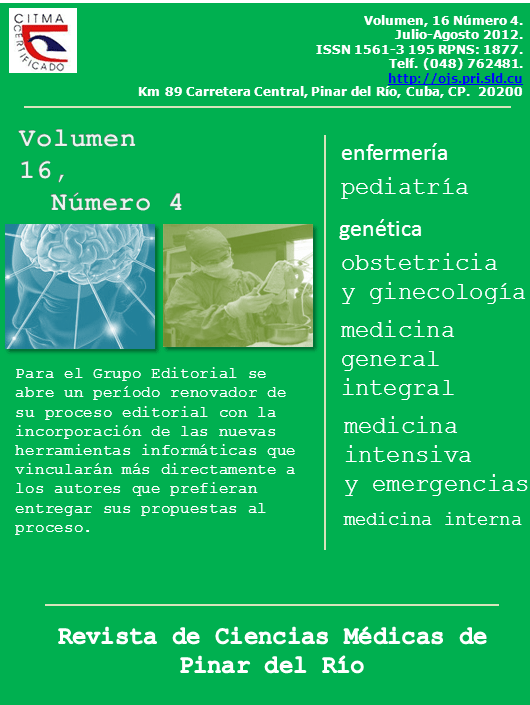A strategy to develop research skills in medical students. Medical University, Pinar del Rio
Keywords:
Strategies, Teaching, Biomedical research.Abstract
Introduction: the process to develop skills is carried out throughout conscious processes; considering when planning it, the approach of the future health professional to the social circumstances and environment together with the comprehensive development of personality, determined by the socio-historical experience mainly, taking into account the activity and the place where the action should be taken, which constitutes the original component of a skill or skills. The process to develop research skills in medical studies is insufficient considering the way they act, showing systemic and systematic thinking.Objective: to design a strategy to the development of research skills in medical students and its implementation in the syllabus of this studies favoring the development of the ways of acting for the future comprehensive doctor.
Methods: dialectic-materialist as a general method, historical-logical, systemic- structural and modelling as theoretical methods as well as group interview to the directives of the Medical Studies, surveys to medical students and professors, documentary review and the opinion of experts as empiric methods. Descriptive statistics included: distribution frequency and measures of central trend.
Results: a strategy was designed to the development of research skills in medical students, which was positively validated by the experts, contributing to its improvement.
Conclusion: the process to develop research skills in medical students at the Medical University in Pinar del Rio is expressed by systemic and systematic thinking.
Downloads
References
1. González Pérez M. Currículo y Formación Profesoral. 2 ed. La Habana: Editorial Científico-Técnica; 2007.
2. Mayor Zaragoza F. Mañana siempre es tarde. 2nd ed. Madrid: Editorial España-Calpe; 2008.
3. UNESCO. Informe Mundial de la UNESCO: Hacia las Sociedades del Conocimiento. París; 2007.
4. Álvarez de Zayas CM, Sierra Lombardía V M. La investigación científica en la sociedad del conocimiento. La Habana: Editorial Científico-Técnica; 1997.
5. Jiménez Paneque R. Metodología de la investigación. Elementos básicos para la investigación clínica. 3 ed. La Habana: Editorial Ciencias Médicas; 1998.
6. Critto A. EI método científico en las ciencias sociales. 4 ed. Barcelona: Editorial Paidós Barcelona; 2006.
7. Hatten KJ. Administración estratégica y política de negocios. 7ma ed. México: Editorial Pearson Educación; 2007.
8. Koontz H, Heinz W. Elementos de administración: enfoque internacional. 5 ta ed. Toronto: Editorial Edesición. Ed. McGraw- Hill, 2007.
9- Valle A. Algunos modelos importantes en la investigación pedagógica. Monografía. La Habana: ICCP, 2009.
10. Proyecto Tuning. Competencias Genéricas de América Latina. [Internet]. 2010 [Citado 19 enero 2011]; 3: [Aprox. 98 p.]. Disponible en: http://tuning.unideusto.org/tuningal/index.php
11. Horruitiner Silva P, González Martínez J. El proceso de formación. Sus características. En: Horruitiner Silva P. La Universidad Cubana: El modelo de formación. 2 ed. V-12. Ciudad de la Habana: Editorial Científico-Técnica; 2007. p .24-35.
12. UNESCO. Declaración Mundial sobre la Educación Superior en el Siglo XXI: Visión y Acción. Y Marco de acción prioritaria para el cambio y el desarrollo de la Educación Superior. Conferencia Mundial
sobre la Educación Superior. [Internet]. Rev. UNESCO. 1998 ene [citado 31 de enero de 2011]. Disponible en: http://www.unesco.org/education/educprog/wche/declaration_spa.htm
13. Colectivo de autores. Informe final-Proyecto Tuning-América Latina. 2004-2007. Universidad de Deusto-Universidad de Groningen; 2007.
14. Álvarez de Zayas CM. La contradicción dialéctica como invariante para la estructuración del proceso docente-educativo. Rev. Educ. Sup. Cub. [Internet]. 1997. feb [Citado 24 de febrero de 2011]; 17 (2): [Aprox. 5p.]. Disponible en: http://dialnet.unirioja.es/servlet/articulo?codigo=2399915
15. García Cuevas JL. Gestión de Ciencia e Innovación Tecnológica en las universidades. La experiencia cubana.1 ed. La Habana: Editorial Félix Varela; 2006.
16. Horruitiner Silva P. El proceso de formación en la universidad cubana. Pedagogía Universitaria. [Internet]. 2006 jul [Citado 24 de febrero de 2011]; XI (3): [Aprox. 13p.]. Disponible en: http://cvi.mes.edu.cu/peduniv/base-de-datos/2006-vol.-xi-no.-3/el-proceso-de-formacion-en-la-universidad-cubana/view
17. Chávez JA. Aproximación a la teoría pedagógica cubana. Congreso Pedagogía 2003. Ciudad de La Habana, Cuba; 2003.
18. Álvarez de Zayas C. Didáctica: La escuela en la Vida. 3 ed. Ciudad de la Habana: Editorial Pueblo y Educación; 2000.
19. Huerta A. Desarrollo Curricular por competencias profesionales integrales. [Internet]. 2009 jan-feb [Citado 3 Marzo 2012]; 3: [Aprox. 47p.]. Disponible en: http://educacion.jalisco.gob.mx/consulta/educar/13/13Huerta.html
20. Machado Ramírez EF. Transformación-acción e investigación educativa. En: De la Herrán A, Hashimoto E, Machado E. Investigar en educación: fundamentos, aplicación y nuevas perspectivas. España: Editorial Diles; 2005.
21. Álvarez G. Importancia de la metodología de la investigación jurídica en la formación del abogado. [Internet]. 2003 ene [citado 31 de enero de 2012]. Disponible en: http://www.lasemanajuridica.cl/LaSemanaJuridica/1401/article-33408.html#null
Published
How to Cite
Issue
Section
License
Authors who have publications with this journal agree to the following terms: Authors will retain their copyrights and grant the journal the right of first publication of their work, which will be publication of their work, which will be simultaneously subject to the Creative Commons Attribution License (CC-BY-NC 4.0) that allows third parties to share the work as long as its author and first publication in this journal are indicated.
Authors may adopt other non-exclusive license agreements for distribution of the published version of the work (e.g.: deposit it in an institutional telematic archive or publish it in a volume). Likewise, and according to the recommendations of the Medical Sciences Editorial (ECIMED), authors must declare in each article their contribution according to the CRediT taxonomy (contributor roles). This taxonomy includes 14 roles, which can be used to represent the tasks typically performed by contributors in scientific academic production. It should be consulted in monograph) whenever initial publication in this journal is indicated. Authors are allowed and encouraged to disseminate their work through the Internet (e.g., in institutional telematic archives or on their web page) before and during the submission process, which may produce interesting exchanges and increase citations of the published work. (See The effect of open access). https://casrai.org/credit/



